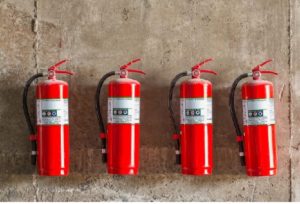
Here are scenarios that can occur if you don’t use the right fire extinguisher to put out a fire.
We don’t want fires to break out, but when they do, it’s easy to go into panic mode. You’ll likely want to either escape the premises if the fire has gotten too large or put out the fire if it’s still small enough to handle. If you’re going to put out a fire, you’ll likely turn to a portable fire extinguisher for help.
What some people could possibly not know is that there are different varieties of extinguishers, and they handle different kinds of fires. Not using the right fire extinguisher for a certain fire can prove ineffective, and it can even put the user and others in more danger. Here are scenarios that can occur if you don’t use the right fire extinguisher to put out a fire.
CO2 Fire Extinguisher Misuse
A CO2 fire extinguisher discharges carbon dioxide in a burst of between 10 and 15 seconds. By targeting a fire with this extinguisher, you can cause the fire to suffocate. The danger with this type of fire extinguisher, though, is that it takes up the oxygen inside a room. For small rooms especially, this can be a serious danger because you risk having the user suffocate if they are in a small enough room that doesn’t have much oxygen already. You also have to factor in the accelerated heart rate that often comes with fighting a fire, as it can be a highly stressful undertaking. This causes you to breathe more rapidly, so you’ll consume oxygen that much quicker.
Misuse of Type A, B, and C Fire Extinguishers
If you’re using either a type A, B, or C fire extinguisher, do NOT use them on chemical fires. The contents of these carbon fire extinguishers could trigger a chemical reaction, resulting in large and devastating explosions that can either seriously injure or even kill people. These extinguishers are meant to handle fires that are caused by flammable liquids, such as gasoline and oil.
Misuse of Water-Based Fire Extinguishers
Extinguishers that are water-based should never be used to combat oil or electrical fires. If you attempt to do this, it will result in either explosions or shocks. For oil fires, you can even cause the oil to spread to more areas and cause the fire to grow.
KEEP YOURSELF SAFE WITH ANDERSON FIRE PROTECTION, INC.
Anderson Fire Protection, Inc. has the expertise and skill to help your home or commercial property for all your fire protection needs. We have been working in the Maryland, Northern Virginia, Southern Pennsylvania, and Washington, D.C. areas for over 25 years. We are known for our top-notch customer service and high-quality results. If you are ready for fantastic fire prevention and protection services, from fire sprinkler installation to fire alarm design and to consult, give us a call at (410) 796-4915 or visit us online.
